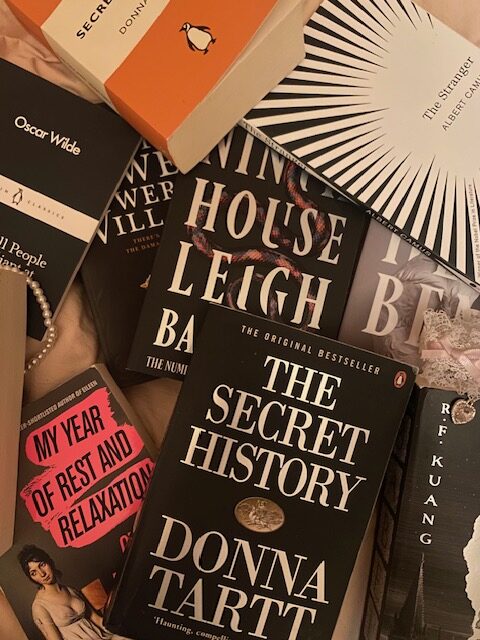Like Richard, I was engulfed in Donna Tartt’s The Secret History when I first read it. It seemed great to me. Aesthetic and beautiful. Living in a giant school with dark, gothic architecture. Reading clothbound books from the library with dust on them. Wearing blazers, mary-janes and mysterious glasses. It seems awesome. Right? That is the outside of “Dark Academia”. Originally a satirical book-genre, now a world-renowned aesthetic.
“Dark Academia” is a genre that has, through recent years, steadily gained popularity. A loose description of the genre’s aesthetic and characteristics is that it often is set in an academic environment, or with an academic stylistic choice. The aesthetic is often dark, with descriptions of gothic architecture, and mysterious people. Lately, the aesthetic has also been connected to the “old money”-aesthetic. The genre has received criticism for being elitist and racist. I fully believe that a lot of the “Dark Academia”-characters are exactly that. Both elitist and racist. And a heap of other equally horrific traits. The genre, however, I believe is quite the opposite of that.
When Donna Tartt first wrote The Secret History, none of the characters were meant to be especially likeable. If you think you can sniff out homophobic attitudes, a racist mindset, and rich college-kids being elitist, you are correct. Tartt made the characters to show these traits as a critique of them. By writing a satirical book about elitist, racist, homophobic, college-students, so engulfed in the classics they study, and the aesthetic they see in front of themselves, she is also writing a biting critique of this specific culture. I believe that the genre never were meant as an aesthetic to aspire to, but rather as a warning.
R. F. Kuang’s Babel bears a lot of the same characteristics. It is set in Oxford – the epitome of a “Dark Academia”-school, and follows language students during colonial-time England. If you were to make a moodboard of the aesthetics you’d think about while reading the book, it would’ve been very close to the blueprint of “Dark Academia”. The book is that way in and of itself with multiple footnotes every page, a dark cover, and a setting so aesthetic that Richard (TSH) would’ve cried. What the book tries to formulate, however, is a critique of this world. Colonial-time England. Universities that are so far up their own asses that they stop caring about the students that struggle to survive. The obvious racism, and elitist thinking – that eventually leads to their downfall.
I realise that I am saying all of this with a very strict tone. I also enjoy the “Dark Academia” aesthetic. Glasses, gingham-patterned miniskirts, and knitted sweaters are never a negative. The “Dark Academia” genre is also one of my favourites, and I can’t lie when I say that it isn’t at least partly because of the aesthetical world I’m diving into. There is just something so appealing about gothic, english, schools, and an appreciation for the written art. The way that the aesthetic has spiraled completely out of its own purpose, however, is something I would criticise.

I don’t think that Donna Tartt, R. F. Kuang, James Baldwin, and Oscar Wilde would want the only thing connected to their books to be pinterest-photos of coffee-cups, architecture, and a glorification of the old, rich, and -phobic.
The “Dark Academia”-genre, and aesthetic, is however now connected way more to the covers of these literary pieces, coffee, and gingham-patterned miniskirts than the content.
And if that doesn’t make us all, at least a little, Richard-esque, then I don’t know. When it comes to the piece, don’t we all want to live inside of the aesthetic of The Secret History, even though we know that the book is a critique of its own aesthetic? I know I would! So even though Richard is annoying, and lying, there is at least a part of our-self that can relate to his need for the beautiful.
The “Dark Academia”-genre might’ve spiraled out of its own meaning, but doesn’t that just reflect back to the genre itself? When we read the books and talk about how hot Henry looks, and the gothic aesthetics, aren’t the books just a commentary of ourselves?
I think so. The “Dark Academia” aesthetic might seem silly or too pinterest-esque, but that also makes it a commentary of itself the way it started. The way it was intended. So maybe we are the ones craving aesthetic and beauty, and Tartt is the one who always was one step ahead of us all.